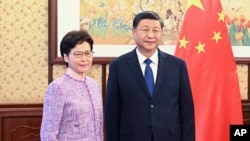Pro-Chinese Communist Party candidates secured an unsurprising victory in Hong Kong’s recent legislative elections after the laws changed to ensure that only pro-Beijing candidates would be allowed to run for office and pro-democracy activists were imprisoned.
Under the new laws, the number of directly elected lawmakers was reduced from 35 to 20 -- even as the legislature was expanded from 70 to 90 seats. Most of the lawmakers were appointed by pro-Chinese Communist Party entities, ensuring that they made up the majority of the legislature.
Not surprisingly, voter turnout was at an all-time low of 30.2 percent -- the lowest since the British handover of Hong Kong to China in 1997.
In a joint statement, U.S. Secretary of State Antony Blinken along with the Foreign Ministers of Australia, Canada, New Zealand and the United Kingdom expressed “grave concern over the erosion of democratic elements of the Special Administrative Region’s electoral system. Actions that undermine Hong Kong’s rights, freedoms and high degree of autonomy are threatening our shared wish to see Hong Kong succeed.”
Since 1997, candidates with diverse political views have competed in elections in Hong Kong. But the most recent elections reversed this trend. The restructuring of Hong Kong’s electoral system enacted earlier this year “eliminated any meaningful political opposition,” the joint statement noted. Meanwhile, many of the city’s opposition politicians remain in prison pending trial, with others in exile overseas. Included among them is the majority of the 47 candidates involved in democratic primaries last year who were charged with “conspiracy to commit subversion” under the National Security Law.
The United States and its allies said they remain “gravely concerned at the wider chilling effect of the National Security Law and the growing restrictions on freedom of speech and freedom of assembly, which are being felt across civil society. NGOs, trade unions and human rights organizations not supportive of the government’s agenda have been forced to disband or leave, while media freedoms are being curtailed at pace.”
Free and fair democratic elections are critical to ensuring the stability and prosperity of Hong Kong. The joint statement urged “the People’s Republic of China to act in accordance with its international obligations to respect protected rights and fundamental freedoms in Hong Kong, including those guaranteed under the Sino-British Joint Declaration.”














